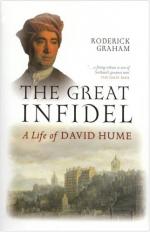|
This section contains 18,613 words (approx. 63 pages at 300 words per page) |

|
SOURCE: “Philosophy and Christendom” and “English Barbarism: ‘The Poor Infatuated Americans,’” in Philosophical Melancholy and Delirium: Hume's Pathology of Philosophy, The University of Chicago Press, 1992, pp. 102-18 and 290-313.
In the first chapter below, Livingston explores Hume's attitudes toward religion and philosophy. In the second, he examines Hume's support of the American Revolution and his criticism of British imperial policy.
Chapter 5: Philosophy and Christendom
The Union of Philosophy and Christianity
Hume taught that philosophy was a novelty in the ancient world. The principles of ultimacy, autonomy, and dominion introduced a new and demanding guide to life unlike anything the polytheists had known. Philosophy in the name of reason claimed total dominion over the life of the thinker, the sect, and in principle over all men. Polytheistic culture eventually came to admire its philosopher; and philosophy, with its title to dominion, became “the sole principle, by which a man...
|
This section contains 18,613 words (approx. 63 pages at 300 words per page) |

|


